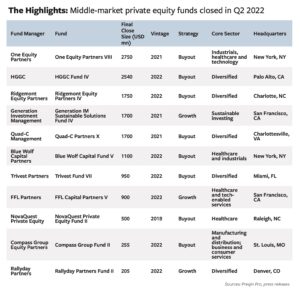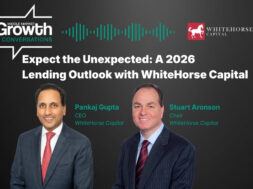East Coast Firms Dominate Q2 Capital Collection
Most of the larger mid-market funds raised in the second quarter came from the East Coast, with several West Coast players also making the list in an increasingly tough environment for fundraising

While fundraising is getting more challenging amid a backdrop of market headwinds, several well-known middle-market firms were successful in raising capital in the second quarter, mainly from return investors and some international players. Most of the funds raised in Q2 came from well- entrenched East Coast investors, while several notable firms on the West Coast made the list too.
Rounding out our highlighted fundraisers were two firms from St. Louis and Denver.
Overall, fundraising was down in Q2 compared to the prior quarter and last year, mainly driven by a “risk-off environment,” where investors focus on safer assets like bonds and de-emphasize equities or alternative investments.
This section of the report originally appeared in Middle Market DealMaker’s Fall 2022 issue. Read the full story in the archive.
This is amid concerns about inflation, a recession, the war in Ukraine, dislocation in the energy markets and other factors. Overall, U.S. middle-market private equity funds raised $29.9 billion in the second quarter, compared to $42.8 billion in the first quarter of this year, according to Preqin. Year-over-year, the amount is also down as compared to $38.8 billion collected in the second quarter of 2021.
“Risk assets are having a rough ride in 2022. The outbreak of war in Ukraine has exacerbated existing inflationary concerns and prompted risk-off sentiment across global financial markets,” says Preqin’s Private Equity Q2 2022 report. “At the same time, higher interest rate expectations have crystalized into higher long-term bond yields as the Federal Reserve has taken aggressive action to rein in excess liquidity.”
Despite these headwinds, multiple private equity firms around the country managed to collect oversubscribed funds in the second quarter. Some of them credit their successes to re-ups with existing investors, international LPs and closely targeted relationships.
Familiar Names on the East Coast
Six of the 11 funds highlighted in this quarter’s fundraising report are well- known firms on the East Coast that are returning for consecutive funds, whether it’s their sixth, seventh or even 10th fundraise. One Equity Partners in New York closed its One Equity Partners VIII fund at $2.75 billion, while Ridgemont Equity Partners in Charlotte, North Carolina, closed on $1.75 billion for a fourth fund.
Quad-C Partners in Charlottesville, Virginia, was successful in collecting $1.7 billion for its 10th fund. Further down the East Coast, Trivest Partners closed two new funds, the Trivest Fund VII and Trivest Discovery Fund II, in May at $950 million and $600 million, respectively. The firm focuses on founder-owned businesses in its main fund/strategy. The Discovery line of funds does the same while targeting smaller businesses with $4 million in EBITDA or less.
“Despite a crowded private equity fundraising market, Trivest received significant support from both its established investor base and a select group of new investors,” a press release from the firm says. “Both funds include a diversified mix of limited partners including endowments, corporate and public pensions, insurance companies, funds of funds and family offices.”
Related content: PE Fundraising Dips from Recent Highs, Funds Lean on Familiar LPs
David Lippin, managing director and head of investor relations at One Equity Partners, agrees that the market has been tough for fundraising so far this year. “There is a traffic jam of funds trying to raise money,” he says. One issue driving the decline in overall fundraising is the “denominator effect,” he explains.
 As the value of public stocks has declined this year, institutional investors appear underexposed to public equities and overexposed to private equity as a percentage of their portfolios. As such, they are being cautious about putting any more money to work in private equity. “If they were going to add relationships, it’s mostly re-ups and, even in that case, they’re going to cull some names,” Lippin says.
As the value of public stocks has declined this year, institutional investors appear underexposed to public equities and overexposed to private equity as a percentage of their portfolios. As such, they are being cautious about putting any more money to work in private equity. “If they were going to add relationships, it’s mostly re-ups and, even in that case, they’re going to cull some names,” Lippin says.
Still, One Equity had an oversubscribed fund and raised money over its initial hard-cap. The firm received strong support from existing investors as well as LPs in overseas markets in Asia and the Middle East, Lippin says.
The New York-based firm, which spun out of JPMorgan in 2015, takes a value investing approach and is disciplined on price, according to Lippin. While valuation multiples have been heating up across industries, One Equity tends to stick to the 6x-7x range on deals where others might pay a 10x multiple. The firm has also been focusing on corporate carve-outs as companies ramp up selling non-core businesses. Some of its recent investments include building products companies and healthcare-at-home businesses. “We’re more interested in the steady-eddy type businesses rather than sexy software companies,” Lippin says.
West Coast Techies
On the other hand, some of the funds collected by West Coast investors in the second quarter do focus more on “sexy software” and have been successful in their specialty in the heartland of technology. HGGC closed its HGGC Fund IV at $2.54 billion in June. The fund was oversubscribed versus its $2.25 billion target. The Palo Alto, California-based firm raised its fund through a variety of LPs, including pension funds, sovereign wealth funds, insurance companies and other institutions, according to a press release from the firm. Like One Equity, HGGC boasts a group of international investors including those from North America, Europe, the Middle East and Asia. HGGC is focused on four sectors in the middle market: business and tech-enabled services, consumer, financial services, and software and technology.
Nearby in San Francisco, FFL Partners closed its FFL Capital Partners V fund at $900 million in May. The firm focuses on healthcare and tech-enabled services companies. Similar to FFL’s prior funds, Fund V will continue to make equity investments ranging from $50 million to $200 million in control or significant minority stake transactions, an announcement from the firm said.
FFL has already invested in multiple businesses through Fund V, including Velocity Global, New Look Vision Group, One Senior Care, Community Medical Services, Optomi Professional Services and Perlman Clinic. “The firm strives to invest in market-leading companies that have strong and defensible competitive positions, good growth prospects, muted cyclicality and strong management teams,” FFL’s announcement says.
A Duo of Fund IIs
Elsewhere in the country, Compass Group Equity Partners and Rallyday Partners both raised their second funds. St. Louis-based Compass Group collected $255 million in May, while Denver-based Rallyday Partners received $205 million for its Rallyday Partners Fund II in April.
Compass Group received investments from a diverse group of LPs including family offices, pension funds, funds of funds, insurance companies and individual retirement accounts. Compass invests in manufacturing and distribution businesses and consumer services. Its main targets are founder-owned businesses that are seeking their first institutional equity, where the founder usually rolls over a significant amount of equity, says Managing Partner John Huhn. “The goal is to take these businesses, grow EBITDA and achieve multiple arbitrage,” he adds.
Rallyday Partners, meanwhile, offers investors a friendlier fee structure. “We have more upside in exchange for lower management fees,” says Managing Partner Ryan Heckman. The firm also has an LP advisory committee, which acts like a company board and approves the firm’s budget and executive salaries.
Related content: Private Equity Takes a More Targeted Approach
Rallyday’s founders were all CEOs and business builders prior to starting the firm, so they wanted to build a “by founders, for founders type of investment firm that would have been helpful to us when we were building our companies,” Heckman says.
The approach resonated with investors. The firm raised its second fund in just three months. The money was predominantly raised from re-ups, with four new LPs coming into the fold. The firm targeted endowments, foundations and family offices. “We purposely targeted LPs [investors] that founders would admire,” Heckman says. Rallyday is a generalist investor that targets “founders that want to elevate their industry and build business models that are doing something magically different,” Heckman explains.
Rallyday also merged with Parkpoint Advisors, a private equity firm in Portland, Oregon, in July. Parkpoint is an independent sponsor that didn’t have committed capital yet. “We are getting a great team and we’re giving them capital in exchange,” says Heckman. Parkpoint’s employees are relocating from Portland to Denver.
Anastasia Donde is Middle Market Growth’s senior editor.


